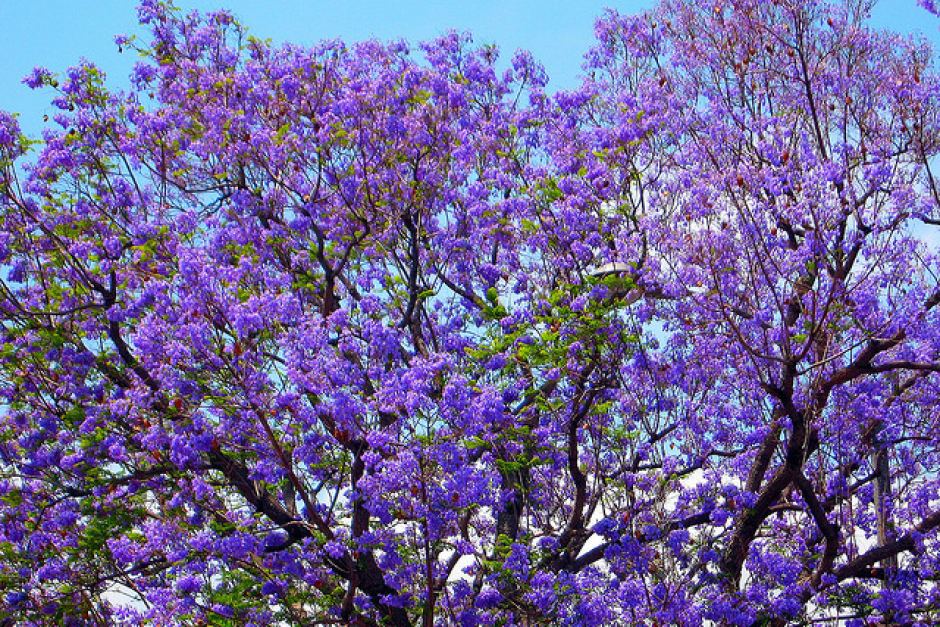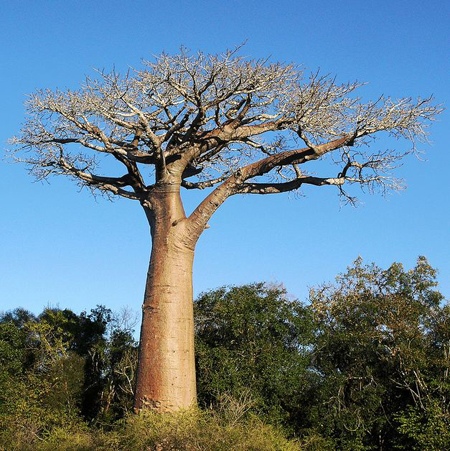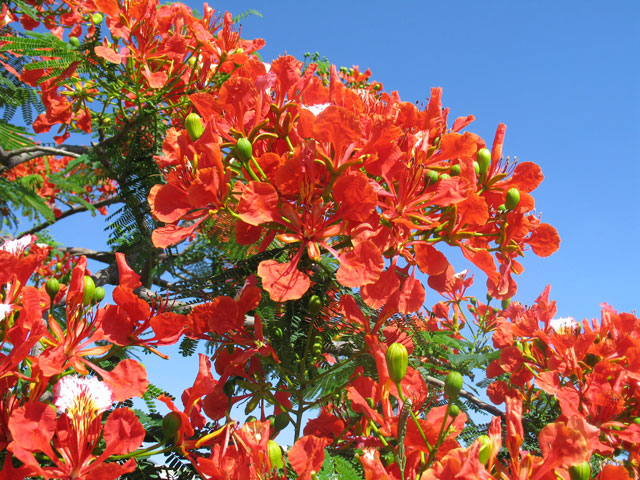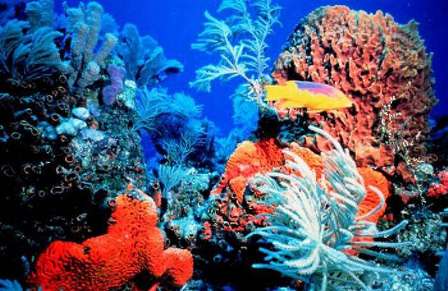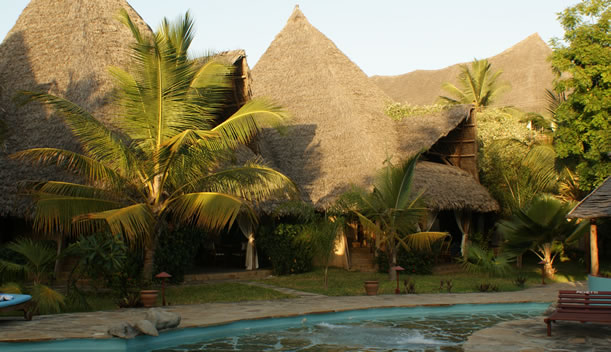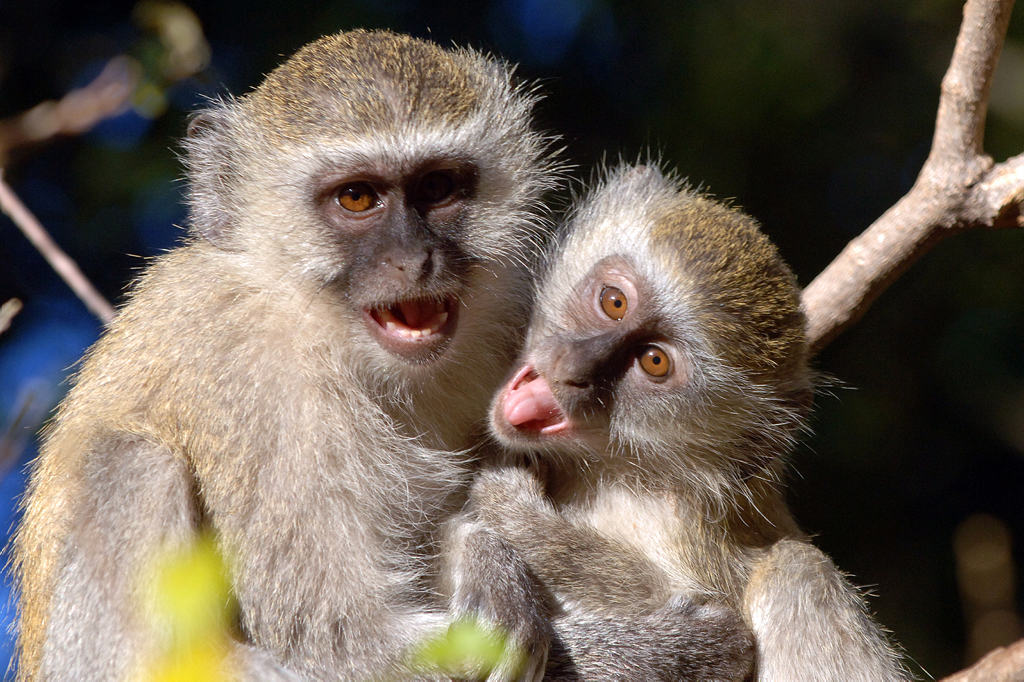Tips for a comfortable, happy and safe visit ...
Mombasa - NOW ...
Kenya is a shimmering jewel under the hot equatorial sky and its palette of extensive colours range from the monochromatic plantations of the fertile north, to gardens of jacaranda, frangipani, bourgonvillea and flame trees.
The southern plains are the home of the flat-topped acacia, barbed thorn bushes and the bizarre baobab trees. The rusty red earth offers a visual relief from the dusty bush and deposits a russet cloak on the otherwise pallid pigment of the elephants' hide. The southern plantations of sisal, mango and coconut fan out from the roads in orderly and regimented ranks.
From the plains to the bush, the savanna to the forests, the coast to the five borders - Kenya is as dazzling and as diverse as a patchwork guilt.
Mombasa is a remarkable melting pot of cultures and tribes. The exotic Arab, Asian and African cultures could have produced a city of psychedelic mysticism and sensual, gastronomic delights. Instead, Mombasa's unvarnished and cosmopolitan canvass is soiled with wretched dwellings of poverty and indifference. The houses are stained with salt, mould and dirt as the walls are unable to dry out in the hot, steamy and humid atmosphere of the equatorial region.
Mombasa's spirited and passionate past is lost within the hopeless neglect that has settled upon it. The city appears paralysed in an antiquated and long forgotten time warp. The roads are made of fatigued tarmac or crumbling coral murrum. Driving is hazardous and in almost every pothole rests a weary, overfed and pregnant goat, insisting one makes a detour rather than respond to ceaseless reminders of its folly.
Where the avenues once had tended grass verges and an abundance of flora, there are corroded cars, refuse and debris. A semblance of a former glory struggles to hang on to an insecure the dusty life. The streets are lined with flimsy shanty shops - and the tattered tyres have become street loungers of the over-exerted or the work-resistant. The parking meters are mostly abandoned, wobbling and tilting together to remind each other of more glorious and affluent days.
Wires of technology and telecommunication twist undisciplined black lines from building to building. The crows enjoy these advantageous perches from which to scream their impromptu lectures over the unyielding traffic. The shops have a paucity of stimulation, quality and cleanliness. Stock is limited, tired and outdates - and a choice is a mere fantasy.
The southern plains are the home of the flat-topped acacia, barbed thorn bushes and the bizarre baobab trees. The rusty red earth offers a visual relief from the dusty bush and deposits a russet cloak on the otherwise pallid pigment of the elephants' hide. The southern plantations of sisal, mango and coconut fan out from the roads in orderly and regimented ranks.
From the plains to the bush, the savanna to the forests, the coast to the five borders - Kenya is as dazzling and as diverse as a patchwork guilt.
Mombasa is a remarkable melting pot of cultures and tribes. The exotic Arab, Asian and African cultures could have produced a city of psychedelic mysticism and sensual, gastronomic delights. Instead, Mombasa's unvarnished and cosmopolitan canvass is soiled with wretched dwellings of poverty and indifference. The houses are stained with salt, mould and dirt as the walls are unable to dry out in the hot, steamy and humid atmosphere of the equatorial region.
Mombasa's spirited and passionate past is lost within the hopeless neglect that has settled upon it. The city appears paralysed in an antiquated and long forgotten time warp. The roads are made of fatigued tarmac or crumbling coral murrum. Driving is hazardous and in almost every pothole rests a weary, overfed and pregnant goat, insisting one makes a detour rather than respond to ceaseless reminders of its folly.
Where the avenues once had tended grass verges and an abundance of flora, there are corroded cars, refuse and debris. A semblance of a former glory struggles to hang on to an insecure the dusty life. The streets are lined with flimsy shanty shops - and the tattered tyres have become street loungers of the over-exerted or the work-resistant. The parking meters are mostly abandoned, wobbling and tilting together to remind each other of more glorious and affluent days.
Wires of technology and telecommunication twist undisciplined black lines from building to building. The crows enjoy these advantageous perches from which to scream their impromptu lectures over the unyielding traffic. The shops have a paucity of stimulation, quality and cleanliness. Stock is limited, tired and outdates - and a choice is a mere fantasy.
YET ...
As a resident or visitor, we anticipate and accept continuous water shortages, stifling power-cuts and incessant telephone malfunctions. To alleviate these frustrations, we can spend weekends on safari and camp in tents with double, four-posted beds, flushing loos and operational showers - or purely relax in small, back to basic bandas along the south or north coast. One can jet ski, snorkel, windsurf, waterski or scuba dive ... or learn to fly, go deep sea fishing or just relax to the sound of the sea, sensitively licking the exotic and romantic beaches.
Opportunities are widespread to revel in the wonders of the wildlife on our doorsteps, where the birds are exquisite, the frogs both loud in dress and voice, and the vervet monkeys comedians of the treetops and patios. The audacious and roguish primates' reputation is poor and unquestionable ... they may steal perfume from this house and fruit from another - yet to others they come to play, tenderly socialise and gather in family groups on patios and lawns. They dance at their reflections in the windows and mischievously taunt household pets. The dogs silently and suspiciously patrol the property's perimeters to shield us from the vervet invaders - any confrontation climaxes in shrieks of delight and howls of frustration.
We can eat out like monarchs - always in the open and under majestic makuti roofs of arresting architecture. The coconut palms standing tall and erect, like trainee telegraph poles, are surely Africa's most important asset - providing uses for roofing, building, industry, food, drink, implements, matting - and more.
We can befriend weary giant tortoises of twelve decades, who gently graze and puff at your feet, or admire shiny black jongolulus purposefully trek paths across the patios. We can feed bush babies whose ears are acutely tuned, like soft leathery radar, to elicit and amplify the flagrant gossip of the African night. You can stroke and feed fish on the coral reef or watch speechlessly and sympathetically as weary turtles nest on certain beaches. We may find elephants aimlessly and silently hiking too close for comfort, or wonder at the unpretentious and serene rock hyrax, the elephants' sticky padded and tiny relative.
We shall be delighted by the friendliness of the people, yet appalled by the squalor that many people seemingly accept and live with, amongst the extremes of wealth, unparalleled wildlife and a thriving tourist trade.
... And without question,we should feel privileged to experience such diversity and untold adventures ... and we should relish this marvellous opportunity to re-awaken our senses, knowledge and understanding of Africa ... because, most important of all ...
Africa has soul ...
As a resident or visitor, we anticipate and accept continuous water shortages, stifling power-cuts and incessant telephone malfunctions. To alleviate these frustrations, we can spend weekends on safari and camp in tents with double, four-posted beds, flushing loos and operational showers - or purely relax in small, back to basic bandas along the south or north coast. One can jet ski, snorkel, windsurf, waterski or scuba dive ... or learn to fly, go deep sea fishing or just relax to the sound of the sea, sensitively licking the exotic and romantic beaches.
Opportunities are widespread to revel in the wonders of the wildlife on our doorsteps, where the birds are exquisite, the frogs both loud in dress and voice, and the vervet monkeys comedians of the treetops and patios. The audacious and roguish primates' reputation is poor and unquestionable ... they may steal perfume from this house and fruit from another - yet to others they come to play, tenderly socialise and gather in family groups on patios and lawns. They dance at their reflections in the windows and mischievously taunt household pets. The dogs silently and suspiciously patrol the property's perimeters to shield us from the vervet invaders - any confrontation climaxes in shrieks of delight and howls of frustration.
We can eat out like monarchs - always in the open and under majestic makuti roofs of arresting architecture. The coconut palms standing tall and erect, like trainee telegraph poles, are surely Africa's most important asset - providing uses for roofing, building, industry, food, drink, implements, matting - and more.
We can befriend weary giant tortoises of twelve decades, who gently graze and puff at your feet, or admire shiny black jongolulus purposefully trek paths across the patios. We can feed bush babies whose ears are acutely tuned, like soft leathery radar, to elicit and amplify the flagrant gossip of the African night. You can stroke and feed fish on the coral reef or watch speechlessly and sympathetically as weary turtles nest on certain beaches. We may find elephants aimlessly and silently hiking too close for comfort, or wonder at the unpretentious and serene rock hyrax, the elephants' sticky padded and tiny relative.
We shall be delighted by the friendliness of the people, yet appalled by the squalor that many people seemingly accept and live with, amongst the extremes of wealth, unparalleled wildlife and a thriving tourist trade.
... And without question,we should feel privileged to experience such diversity and untold adventures ... and we should relish this marvellous opportunity to re-awaken our senses, knowledge and understanding of Africa ... because, most important of all ...
Africa has soul ...
